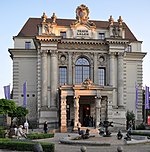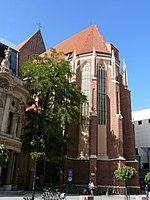The Old Town in Wrocław (Polish: Stare Miasto we Wrocławiu) is the oldest part of the left-bank Wrocław, originating from the thirteenth century. It is surrounded by the City Moat, a remnant of the complex system of fortifications, largely based on natural and artificial sections of the Oder River and the Oława River flowing into it. The green belt along the moat (and further along the Oder) is called the Old Town Promenade.
The center of the old city is the historic Market Square (Rynek), with numerous kamienice, the Old and New Town Hall (Ratusz). There is a number of historic landmarks in its vicinity, such as the Salt Market, St. Elizabeth of Hungary Church, St. Mary Magdalene Church, and numerous monuments. In the northern part of the old town can be found the main campus of the Wrocław University with the University Square, and on the opposite, southern side, lies the famous Quarter of the Four Denominations. The Church of Saints Hedwig and Clara next to Nankiera Square is the mausoleum of many rulers of Silesia, including Henry III, Henry V, Henry VI, and Anne of Bohemia.
Old Town (Stare Miasto) is one of Poland's official national Historic Monuments (Pomnik historii), as designated September 16, 1994 in the first round. Its listing is maintained by the National Heritage Board of Poland. The Old Town is part of the city's administrative district which is also named "Stare Miasto," although it covers a wider area than the Old Town itself.











